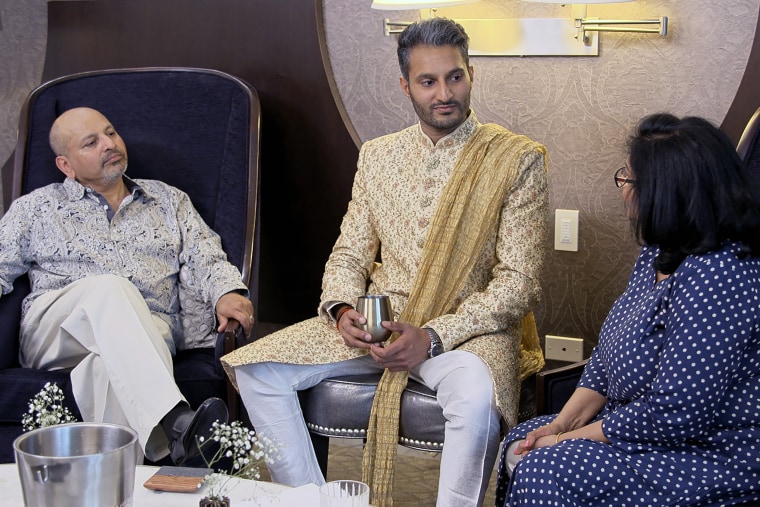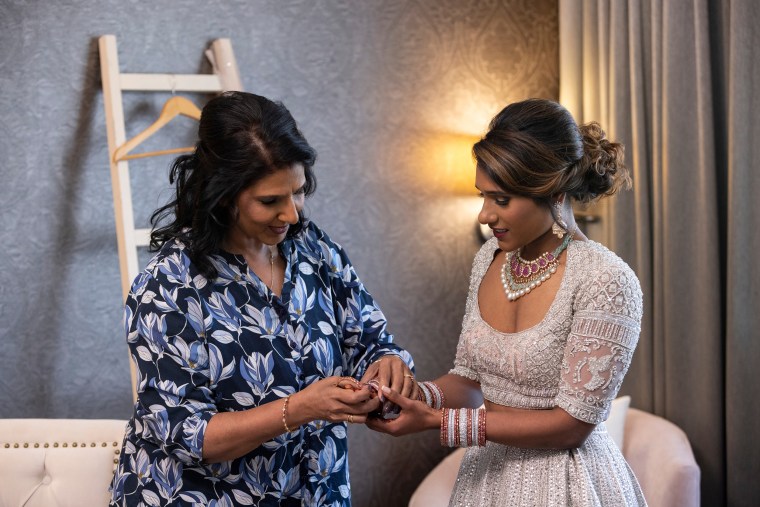In one episode of “Love Is Blind,” the Netflix reality dating show in which people get engaged sight unseen, contestant Natalie Lee speaks to her father, Don, just before her wedding ceremony.
“Of all the things I’ve done in my life,” Don says, beaming at his daughter, “being your dad is my greatest achievement ever.”
The moment is striking, not only because it’s a reprieve from a rather criticized, chaotic second season that concluded last week but also because it’s a sharp departure from the stale image of expressionless, strict Asian parents the media has often been criticized for portraying. But Don’s singular representation of parenting alone isn’t what makes the show’s depictions of Asian immigrant parents groundbreaking.
The range of personalities exhibited by several of the parents of Asian cast members allow for a more nuanced understanding of parenting, simultaneously challenging viewers to look at parental love outside squarely Western forms of affection, experts said. And it’s critical, because good parenting does not exist solely within the confines of the white sitcom family.
“You need consistent depictions of authenticity and to have varying types of authenticity because we’re not all the same either,” Ana-Christina Ramón, director of research and civic engagement in the division of social sciences at the University of California, Los Angeles, told NBC Asian America.

After dating and becoming engaged sight unseen, cast members then move into apartments and settle into their regular lives, weathering the typical challenges of dating, including the art of gaining parents’ approval. In addition to Lee, two other Asian Americans on the show, Abhishek “Shake” Chatterjee and Deepti Vempati, both of Indian descent and engaged to each other, also took part in ceremoniously meeting the parents, who show varying degrees of concern and warmth.
Don sticks out as the ride-or-die proud dad on the show, who appears to accept Lee’s fiance, Shayne, immediately without question. The act of instantaneous acceptance likely aligns more with what many perceive to be parental love in the Western sense, said Stephanie Chan, associate professor of sociology at Biola University in California.
Experts said that this style of parenting, associated with more verbal affirmations of care, is often fully accepted as the most conventional example of love. But Lee’s mother, Nan, who’s eventually won over, is at first visibly concerned and perhaps a bit disappointed about the swift, reality show engagement. The contrasting reactions, said Anthony Ocampo, a sociology professor at California State Polytechnic University, are both forms of parental affection, though they may seem at odds with one another.
“From her mom’s point of view, her skepticism didn’t seem like it was about not approving or not trusting her daughter’s choices. I think, deep down, she just doesn’t want her to get hurt,” Ocampo said. “Whereas with Natalie’s dad, his way of showing love is to accept the choices she makes without judgment.”

When it comes to meeting Chatterjee’s family, his mother, Sita, is forthright, refusing to take his side after he reveals that he felt no physical attraction to Vempati. She underscores how Vempati could easily find someone who loves her "the way she is."
“Being very frank, I’m very much identifying with her right now more than you,” Sita declares, before telling her son that Vempati “doesn’t deserve someone who gives her even half a percent less.”
Though Asian parents are often cast as overly worried about optics, the scene shows empathy.
“I’m sure that Shake’s mom, as a woman, knows what it’s like to be dismissed based purely on looks, and she was like, ‘Nope, this may be my son, but I’m gonna let him know he can’t treat women like that and feel OK about it,'" Ocampo said.
At the end of the series, Vempati’s mother, GV, gives viewers one last emotional glimpse at another profoundly moving relationship after her daughter declares at the altar, before families and friends, that instead of marrying Chatterjee she has chosen herself. Through tears, GV tells Vempati that she’s proud. It’s a pure example of unconditional love, Ocampo said, and Vempati's emotional well-being took precedence.
The media has given the impression that good parenting is done through a largely white, Western lens, even though those ideas are the minority, globally, Ramón said.
“Growing up watching '80s and '90s sitcoms of white families like on ‘Full House’ or ‘Growing Pains,’ there was a particular way that you saw white parents show love,” Ocampo echoed. “They talked to their kids like they were friends, hugging them all the time, or saying ‘I love you’ all the time. Those models sometimes give people the impression that that’s the only way a parent can show love.”
And other families of color are often multiracial or “raceless,” with the cultural aspects scrubbed from the family unit.
“Hollywood thinks, ‘Oh, let’s make this universal.’ And by eliminating cultural references, they really make it more of a default whiteness. They’re representing that you can just plug in anybody,” Ramón added.
While Asian immigrant parents are never as extreme or one-dimensional as the trope viewers see on screen, their method of discipline has been wrongly interpreted as disregard for their child's emotional well-being. Oftentimes immigrant parents, having dealt with racism upon arriving to the U.S., or discrimination in their workplaces, bring those experiences into their parenting styles. Ocampo said many recognize that their own children are not on the “same playing field as the ‘American’ aka white kids,” and may stress that they need to work twice as hard to compete.
“Asian immigrant parents know that the decision to come to the United States is a huge risk, and so the success of their American-born children is proof to their families and loved ones back home that the risk was worth it,” Ocampo said. “That the sacrifices they endured were worth it.”
And while some kids of immigrants may interpret criticism and honesty as lack of approval, Chan said that in many cases it’s a reflection of the closeness Asian parents feel toward their kids, and a form of guidance that others cannot provide in a way a true friend would.
One reason that “Love Is Blind” was able to provide more dimension, Ramón suspects, is that it was a reality show. It could to depict the actual behaviors of Asian immigrant parents in a way that white writers and producers, who might construct what they think is an accurate portrayal, may not be able to.
“This is how real people are,” Ramón said.
